Over the last few months, UMSU’s governance committee has been working on developing and proposing changes to UMSU’s governance structure as a part of efforts started by last year’s UMSU board of directors, which saw UMSU commission a report from Susan Rogers of Rogers Leadership Consulting.
According to UMSU vice-president finance and operations Brendan Scott, the changes are being implemented later than planned as the process was interrupted by the COVID-19 pandemic.
“The governance [committee] took it upon themselves to kind of take on the recommendations [from Rogers],” Scott said.
“The biggest thing we wanted to look into was our board structure. While [Rogers] touched on basically every aspect of our organization, to us the board was the biggest thing.”
In 2018, what was then called UMSU council approved a motion to change its name to the UMSU board of directors.
“She said [the board] was too big. Usually, boards are only [roughly] 12 people — ours was 56,” said Scott.
“Ours was a very representative board as in we had people from different councils, and they would represent [the interests of] those councils whereas usually […] the board is just supposed to vote on what’s best for the union.”
Other concerns raised by Rogers included problems posed by the annual turnover of the board, problems with the potential need to train 56 board members every year and problems arising from having a board which isn’t “very engaged” — according to Scott, there has rarely been greater than 70 per cent of the board attending any given meeting.
So far, the UMSU board of directors has passed three motions instructing the governance committee — the committee handling the work of proposing and implementing the changes — on which changes are to be made.
Motion 0492 tasked the governance committee with implementing the abolition of the use of slates in UMSU elections — once implemented, all candidates running in UMSU elections must do so independently.
Motion 0495 tasked the governance committee with implementing a number of structural changes to the board, including the reduction of board membership to 11 directors to be elected in the week following the elections of UMSU representatives and executives. There will also be new rules capping permitted absences from board meetings for members to five in a year or three consecutive meetings as well as the banning of proxies attending meetings on behalf of board members.
The implementation of motion 0495 also means that UMSU community and council representatives will no longer have voting rights in board meetings, but will be “encouraged to come, weigh in on debate, present, report to the board and report back to their respective councils,” as per the document outlining the changes to be made.
“The only difference is that at the end of the day, when it comes time to vote, it’s based on the 11 people that have been voted in [as directors],” said Scott.
With the passing of motion 0496, the governance committee is also responsible for the creation of a new position on the board, a Black students’ representative.
This motion was the product of collaboration between the University of Manitoba Black Students’ Union (UMBSU) and UMSU. The UMBSU will be appointing an interim representative once the position is created.
Scott said he expects the changes to be implemented before the end of the year, prior to the next round of UMSU elections.
Future changes, according to Scott, will be focused on making the division between governance and operational duties more clearly defined — figuring out what duties are in the purview of elected representatives and which should be handled exclusively by UMSU staff.
“If [the governance committee] can kind of just really go hard, for lack of a better term, we’d be able to change everything this year […] the problem is with all the writing of the actual bylaws […] that’s the slow part,” he said.
“For sure the board structure can get changed this year, and I’d actually see it as a failure if I didn’t get it done before January.”


